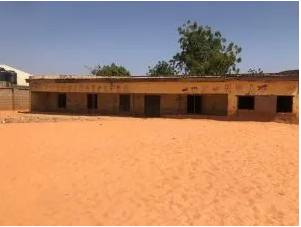
|
Getting your Trinity Audio player ready...
|
When floods hit Cheledi, Guyaba, and other rural communities in Kirfi Local Government Area of Bauchi State, they didn’t just wash away homes and crops, they swept away school bags, uniforms, and dreams.
For many girls, the disaster meant more than physical destruction. It meant an abrupt end to learning and possibly, the end of their education entirely.
In August 2024, Kirfi LGA experienced severe flooding after days of torrential rain. The deluge submerged schools, blocked roads, and displaced hundreds of families. While the entire community was affected, the consequences for girls were especially dire.
Amina Yusuf, a 14-year-old student in Junior Secondary School 2 from Guyaba, has not returned to school since the floods.
“The road to our school was covered in water,” she said. “The school building was shattered and the flood carried away our roofs, windows, and doors. My father said I should stay home for now. But it has been months.”
For girls like Amina, staying home often becomes permanent. Parents who lose their livelihoods during disasters tend to prioritise sons when deciding who should return to school. In many cases, girls are pushed into housework, street hawking, or even early marriage.
“My younger brother goes to school now, but I help my mother at home,” Amina added. “She says maybe next term I will go back, but I don’t know.”
Even before the floods, girls in Kirfi faced significant challenges. According to the Bauchi State Ministry of Education’s 2020/2021 Annual School Census, senior secondary enrollment in Kirfi shows a sharp gender disparity:
SS1: 324 boys, 158 girls
SS2: 282 boys, 126 girls
SS3: 241 boys, only 94 girls
Senior secondary school enrollment in Kirfi LGA (2020/2021): A sharp decline in female students compared to male students across SS1 to SS3 highlights persistent gender disparity even before the floods.
These numbers reveal a steady decline in female enrollment as students progress, a trend now worsened by the floods.
Hauwa Ali, a teacher at a government school in Cheledi, expressed concern:
“The girls are the first to disappear after any disruption,” she said. “And they are the least likely to return. Once they start staying at home, some parents don’t see the need to send them back.”
In rural communities like Kirfi, girls’ education is often seen as optional especially when families face economic stress or traditional roles take precedence.
Floodwaters also destroyed school infrastructure, collapsing buildings, soaking books, and making many classrooms unusable. Makeshift lessons are now held under trees or in damaged blocks.
“The girls feel shy sitting in the open,” Hauwa added. “Some parents say it’s not proper for girls to learn in such conditions.”
Girls also face extra caregiving duties in the aftermath helping younger siblings or assisting displaced families. These unpaid roles, though invisible, create major barriers to returning to school.
Despite the damage, there has been little targeted response from the state government. The Bauchi State Emergency Management Agency (SEMA) reported thousands displaced across the state in 2024, but no education-specific support has reached Kirfi’s remote communities.
In the absence of official help, some women in Guyaba and Cheledi have started informal evening classes gathering young girls in compounds to help them revise schoolwork and retain basic literacy.
“We just do what we can,” said Hajara Musa, one of the women organising the sessions. “Even if it’s just reading two lines a day, it’s better than nothing.”
But these grassroots efforts are limited, lacking trained facilitators, textbooks, or consistent support. Without external help, they may not last.
Education stakeholders, humanitarian groups, and the government must recognise that disasters like floods don’t just destroy buildings, they threaten futures. Urgent interventions like rebuilding classrooms, providing learning materials, and supporting community educators are key to keeping girls in school.
Kirfi’s experience shows how climate shocks, poverty, and gender norms intersect to deny rural girls the right to education. If nothing changes, Amina and many others may never return to the classroom.
Editors note: This story was first published on Nigeria grasroot news
Victoria Ogechukwu, a journalist, is a fellow of 2025 Women in Journalism, gender reporting media fellowship of Africa Foundation for young media Professionals as part of fellowship requirement.






